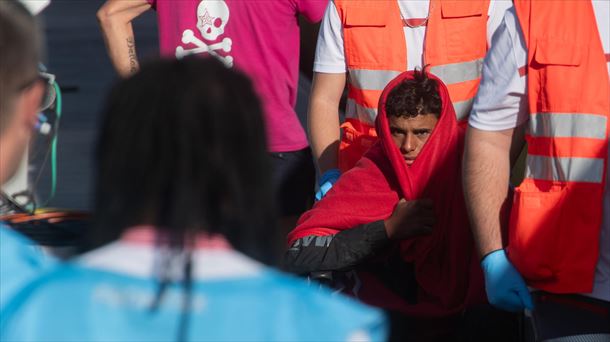There was disruption by pro-Palestinian activists during the ceremony marking the 75th anniversary of the Universal Declaration of Human Rights in parliament in Vienna. The group, among other things, threw brochures from the gallery into the meeting room.
The activists unfurled banners and chanted slogans such as “Stop the genocide” and “You are complicit” before being escorted out of the room. Earlier, they had thrown leaflets from the gallery to the meeting room where the ceremony marking the anniversary of the Universal Declaration of Human Rights was taking place.
Jewish group in solidarity with the Palestinians
The group, calling itself “Not in Our Name,” a Jewish group founded in the US that stands in solidarity with the Palestinians, wanted to draw attention to “how tens of thousands of people are currently being killed in Gaza – most of them children.” ” Dalia Sarig-Fellner, activist of the Jewish group “Not in Our Name Vienna” told Puls24.
The action only briefly disrupted the ceremony, but Wolfgang Sobotka (ÖVP), President of the National Council, still found clear words: “You should be ashamed. What the Hamas terror regime has done is a serious violation of human rights, a law of war that is being abused,” Sobotka said.
“It is doubtful whether it will be adopted today”
The event then continued without further interruptions. Keynote speakers included Elisabeth Hoffberger-Pippan, research associate at the Peace Research Institute Frankfurt.
She said that given the polarization of society, the Universal Declaration of Human Rights is unlikely to be adopted today: “It is doubtful whether a similar comprehensive document could still be adopted today.” A look at the declaration adopted at the time also makes it clear that many rights that are taken for granted today were not yet included at the time.
Justice Minister Alma Zadic (Greens) also doubted whether this would be possible today. But human rights are a living document that is constantly being developed – for example by the European Court of Human Rights.
Emeritus professor of international law Wolfgang Benedek described the issue of migration as a “test for human rights” – namely “in terms of whether we are really willing to live by it”. Restriction is dangerous – “because it makes you wonder who the next group is for whom you think it would be beneficial”. European and international legal expert Walter Obwexer (University of Innsbruck) saw this somewhat differently. A distinction must be made between migration to the labor market and the right to asylum.
Source: Krone
I am Ida Scott, a journalist and content author with a passion for uncovering the truth. I have been writing professionally for Today Times Live since 2020 and specialize in political news. My career began when I was just 17; I had already developed a knack for research and an eye for detail which made me stand out from my peers.



